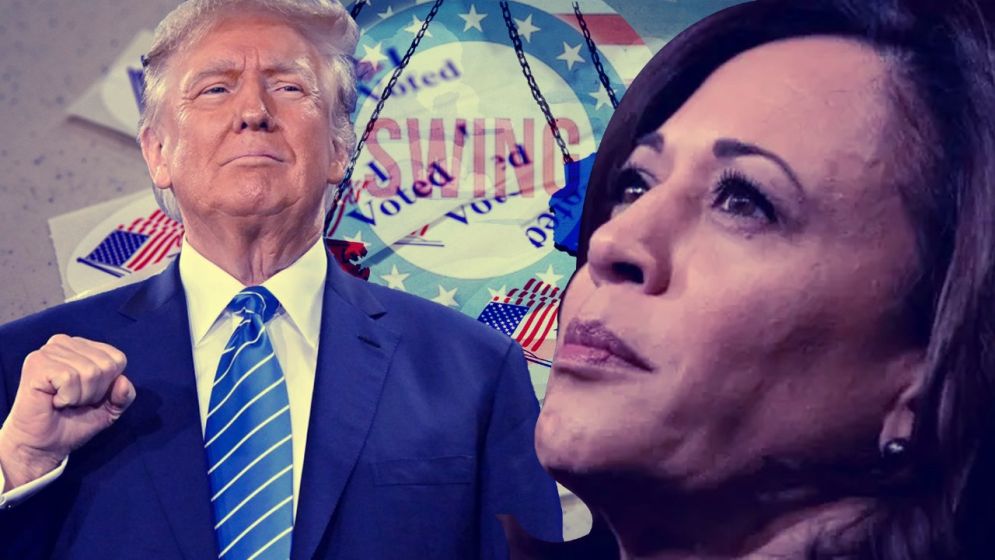Trump’s Triumph: On the verge of reclaiming the Oval Office as the 47th President

The man who instigated the deadly January 6th [in 2021] assault on the U.S. Capitol—his rhetoric sparking an insurrection that claimed five lives and left the nation in turmoil—had weathered political storms that would have shattered most.
He had survived a second impeachment, with the Senate acquitting him once more, despite mounting evidence of his role in inciting the violence.
This was the same man convicted earlier this year on 34 criminal charges, his name now firmly etched in legal history for his alleged involvement in hush-money payments during the 2016 campaign.
And he was not just facing these charges: he was also confronted with a growing list of criminal counts across multiple ongoing investigations, each promising to stir even more controversy and legal chaos.
On top of it all, he was embroiled in a number of civil lawsuits, including one filed by a woman who accused him of rape—a claim that, after a lengthy trial, a judge deemed “substantially true.”
This was no ordinary political comeback. This was Donald Trump—described by senior military officials as a “fascist” and a dire threat to the republic, a man whose presidency had divided the country like never before, whose very actions had upended the norms of American democracy.
Yet, despite all of this—despite the scandals, the court battles, the moral and political upheaval—Trump, at 78, was once again on the verge of reclaiming the highest office in the land, defying expectations and putting the finishing touches on a grueling, nearly 100-day sprint of a campaign.
Leading up to Election Day, polling in seven key battleground states showed little to no separation between the two candidates.
In fact, the race had remained too close to call for weeks, with both both Trump and Democratic Presidential nominee Kamala Harris trading punches in a political brawl that seemed to tighten by the hour.
But by 2 a.m., as the final votes trickled in, the picture had begun to take shape. Trump had secured 277 electoral votes—seven more than the 270 needed to win the presidency.
Among those crucial votes were the pivotal states of Pennsylvania and Georgia—two states that had been widely viewed as the tipping point for the 2024 election.
Their outcome had been expected to carry the weight of history, and many had predicted that whichever candidate triumphed in these battlegrounds would effectively seal their victory.
In Pennsylvania, Trump had managed to outpace expectations, flipping a state that had been a critical part of Joe Biden’s 2020 win.
Georgia, once considered a solid red stronghold, had been another key battleground that many thought Harris could flip back to the Democrats.
But Trump’s campaign, with its well-oiled machine and populist fervor, had surged past Harris, proving that the political landscape was shifting once again in his favor.

The joyous mood of Trump campaign
As the early morning hours stretched past 2 a.m., the crowd in a Florida arena grew restless, the atmosphere charged with anticipation. Then, at last, Trump appeared on stage, his presence as commanding as ever.
The familiar strains of God Bless the USA, Lee Greenwood’s anthem of patriotic fervor, filled the air, reverberating through the hall and underscoring the moment.
This song, long intertwined with Trump’s brand of populism, had become the soundtrack to his political rise and rallying cry for his base. As the melody echoed through the venue, it served as the perfect backdrop to his comeback speech.
It was a scene that felt all too familiar—Trump at the center of the stage, his supporters raucous with enthusiasm—but this time, the stakes were higher, the weight of the moment heavier.
Trump stood surrounded by his family, his inner circle of loyal advisers, and a cadre of hard-right allies. Among them was JD Vance, the combative Ohio senator whom Trump had chosen as his vice-presidential pick.
Vance, whose political ascent had been powered by Trump’s endorsement, stood by his side like a shadow, further solidifying the bond between Trump’s populist movement and the far-right wing of the Republican Party.
The two men shared a mutual admiration, a connection forged in the trenches of culture wars and a shared disdain for what they saw as the establishment elites.
As Trump began speaking, his voice was steady, yet his tone carried the familiar defiance. Despite the legal challenges looming over him and the political forces that had long sought to block his return, he stood resolute.
This was his moment—his chance to prove the doubters wrong, to reclaim the office that had once seemed lost to him.
“This is a movement like nobody’s ever seen before,” Trump said. “This is, I believe, the greatest political movement of all time. There’s never been anything like this in this country and now it’s going to reach a new level of importance, because we’re going to help our country heal.”
“We’re going to fix our borders. We’re going to fix everything about our country … I will not rest until we have delivered the strong, safe and prosperous America that our children deserve, this will truly be the golden age of America.”
Trump revealed in battleground state victories and said he would win them all. He claimed to have won the popular vote, which had not yet been decided.
He described “a great feeling of love” and claimed “an unprecedented and powerful mandate”, celebrating Republicans retaking the Senate. He said it looked like Republicans would keep control of the House of Representatives – again, undecided at that point.
Trump saluted his wife, Melania, his family, and Vance, who also spoke, promising “the greatest economic comeback in American history under Donald Trump’s leadership”.
Trump referred to the assassination attempts against him. “God spared me for a reason,” he said.

The Somber mood of democratic
campaign
For the Democrats, the unthinkable was beginning to feel eerily familiar as the election results started to pour in.
Once more, they found themselves staring down the possibility of a Trump victory, a painful déjà vu of the 2016 election they had so desperately hoped to move beyond.
By the time the Associated Press had called two critical battleground states—North Carolina and Georgia—in Donald Trump's favor, the mood among Democrats shifted from cautious optimism to a chilling sense of dread.
Across the country, Trump was outperforming his 2020 margins, extending his influence into areas where Democrats had hoped to gain ground.
In stark contrast, Vice President Kamala Harris was struggling to match Joe Biden’s performance in key regions that had swung blue in 2020.
In many areas, her deficits were widening as Trump’s leads grew—especially in traditionally red strongholds.
With each passing hour, Harris' path to the White House grew narrower. What had begun as a tense, nail-biting election night was quickly morphing into something far more ominous.
Democrats, long weighed down by anxiety over the outcome, were now grappling with something deeper: shock, despair, and for many, a grim acceptance that a defeat might be inevitable.
"I think it’s over," Richard Harrison, a Democratic pollster in New York, told Bangla Outlook. "We’re beginning to feel that Trump will win every swing state, with maybe the exception of Michigan. It's just not happening for us this time."
As the night stretched on, those still holding out hope for Harris began to face the harsh reality. Some campaign staffers clung to the belief that outstanding ballots—particularly mail-in votes—might still swing in her favor.
But that hope was rapidly diminishing as Trump continued to rack up state after state. The sense of inevitability among Democrats grew with each new call in Trump’s favor.
Around 1 a.m., former Rep. Cedric Richmond, a co-chair of Harris' campaign, took the stage at Howard University—her alma mater—and effectively put an end to what had once been billed as a victory celebration.
The atmosphere in the room, once alive with energy and excitement, had shifted into something darker—like a waking nightmare. The hopeful cheers of earlier had given way to uneasy murmurs, as reality began to set in for the gathered supporters.
“We still have votes to count, we still have states that have not been called yet,” Cedric Richmond told the crowd, trying to project some semblance of optimism despite the heavy air of defeat that was rapidly descending over the event.
“We will continue overnight to fight to ensure that every vote is counted, that every voice has been heard.”
But there was no hiding from the truth. Richmond quickly followed with a sobering reminder: “You won’t hear from the vice president tonight,” he said. “You will hear from her tomorrow.”
It was a stark shift in tone from earlier in the evening, when the campaign had been more resolute, even sending out a memo from Harris' campaign manager, Jen O'Malley Dillon, reassuring staff that the night was far from over.
But now, that optimism had all but evaporated, and what had once been a hard-fought battle for the future of the nation seemed to be slipping into a rout.
Inside the venue, the mood was palpable. What had been planned as a victory celebration for Harris and the Democrats had turned into an uncomfortable reckoning.
It was no longer just about the numbers on the map. It had become a moment of painful reflection for the Democratic Party—one that illuminated a harsh reality.
Despite its efforts to build a more inclusive, diverse coalition, the party was once again at risk of losing to a man who had stoked deep divisions across the nation.
The same man whose rise had once been dismissed as a passing storm in 2016, but who had returned stronger than ever, defying every prediction from pundits, pollsters, and analysts alike.
For Harris, who had fought so hard to break barriers and make history, the night served as a sobering reminder that even progress comes at a cost.
For the Democrats, it was a painful reckoning—one that revealed how fragile victory could be, even when the advantages seemed stacked in their favor.
—

